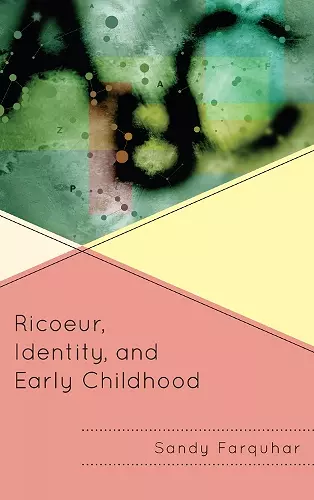Ricoeur, Identity and Early Childhood
Format:Hardback
Publisher:Rowman & Littlefield
Published:16th Oct '10
Currently unavailable, and unfortunately no date known when it will be back

Early childhood education in Western society has come under increasing scrutiny by governments that see early education as an important factor in economic growth and development. Thus, social traditions in the field are increasingly giving way to an intensified focus on marketization and regulation, but with a corresponding diminishing concern for ethics and social participation. Drawing on the work of contemporary French philosopher Paul Ricoeur, Sandy Farquhar analyzes the problematic way in which we become who we are and the discourse that surrounds that learning. The book explores the ethical basis of identity formation in early childhood education and seeks fresh alternatives to commonly accepted perspectives on social policy, education, and the nature of our 'selves.' Farquhar uses Aotearoa New Zealand bicultural curriculum and policy context as examples for developing the theme of curriculum as a contest of ideas and a powerful form of resistance. Promoting the importance of narrative in understanding identity formation, the book elaborates on contemporary themes of difference, ethics, and social justice, calling for a revitalized sense of liberalism and social democracy.
Sandy Farquhar brings a fresh, intense and challenging lens to New Zealand's early childhood pedagogy and policy: that of philosophy. As the paradigm of early childhood shifts even further from its developmental roots where it emerged, this book will become an important tool towards engaging the profession in such a mind change. -- Helen May, Dean University of Otago College of Education
French philosopher Paul Ricoeur's theory of "narrative identity," by which individuals come to know and guide themselves through storytelling, is used by Farquhar (Univ. of Auckland, New Zealand) to frame a critique of early childhood education in Aotearoa (Maöri) New Zealand. As in other Western societies, education currently is dominated by market considerations, neoliberal rationality, and individual responsibility, to the detriment of social ethics and participation. From her analysis, both of Ricoeur and the Maöri, Farquhar concludes in the final chapter, "An 'Other' Narrative," that "recognizing difference" and "creativity as an ethical paradigm" have promise for a better early childhood education. The analysis is presented in five chapters that explain Ricoeur's narrative theories and four chapters that outline the ruling, and Farquhar's alternative, ideas of identity and subjectivity in early childhood education. The editor of the series in which the book is published thinks it can be read profitably by "all early childhood educators, indeed teachers at all levels," and Farquhar herself acknowledges that though the focus is on Aotearoa New Zealand, "it is set within a global political context." Summing Up: Recommended. * CHOICE *
ISBN: 9781442206458
Dimensions: 240mm x 162mm x 17mm
Weight: 438g
184 pages